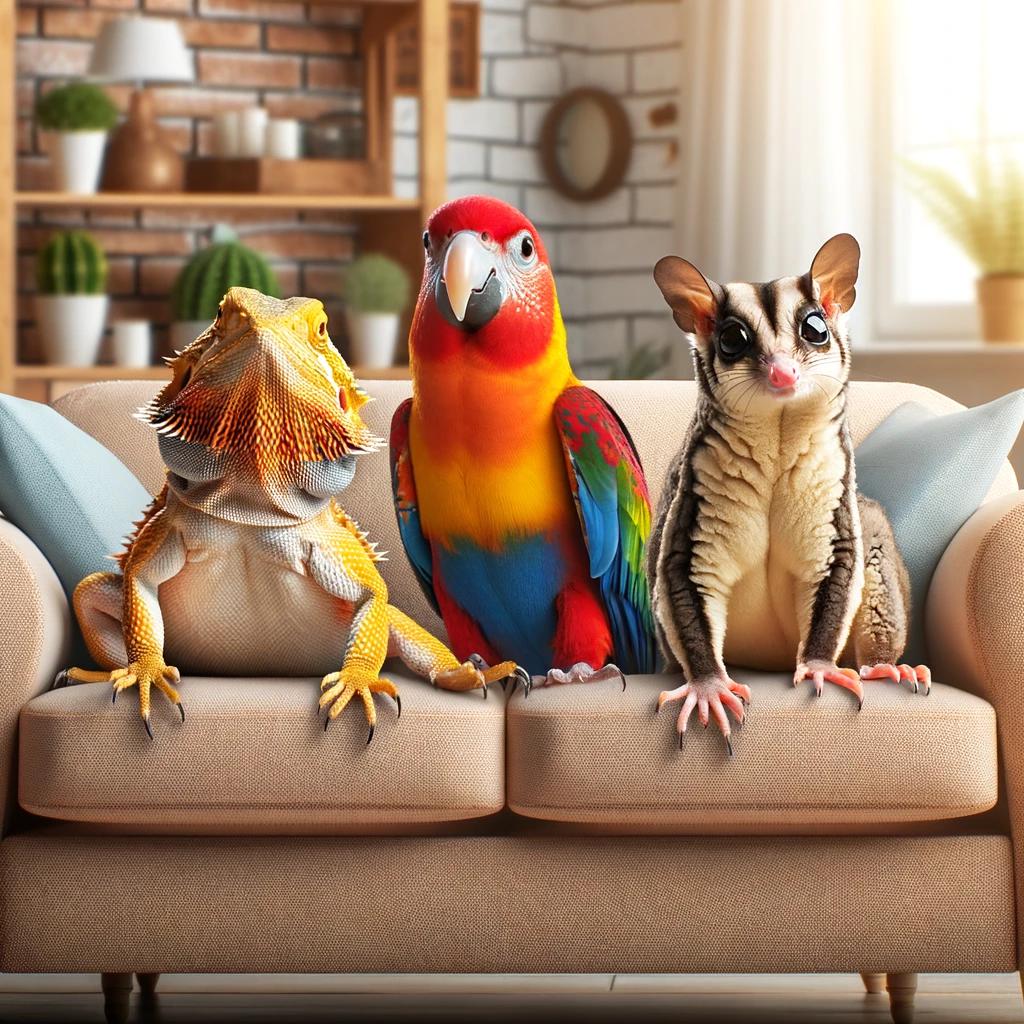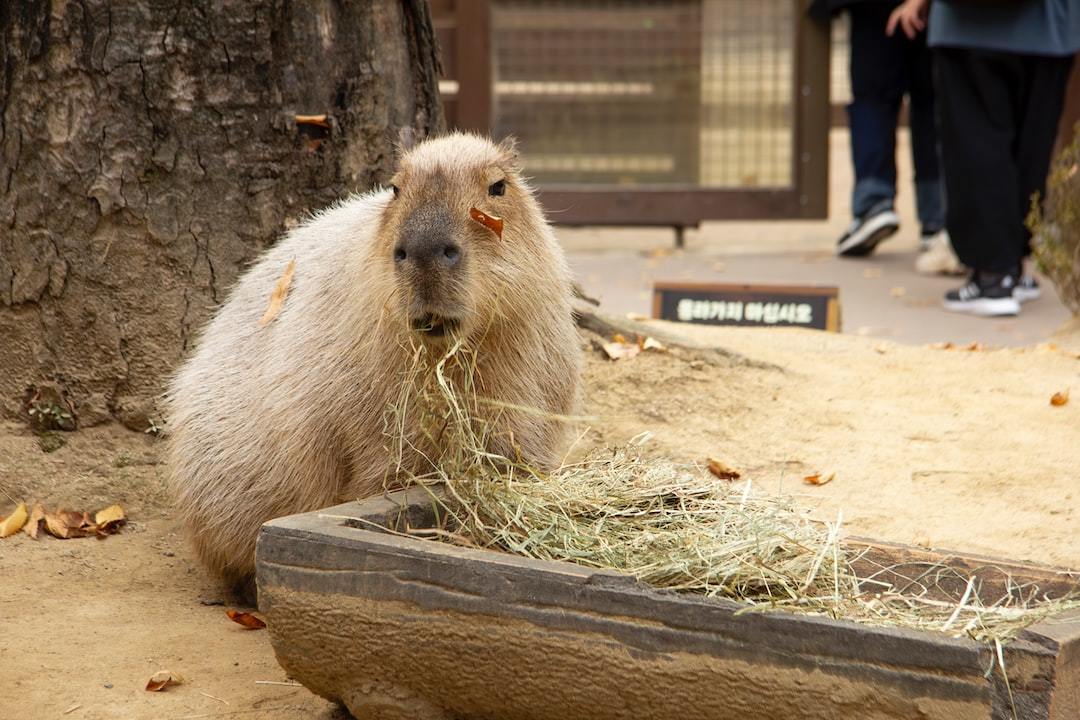Walking into a home and being greeted by a capybara lounging on the sofa or a parrot reciting Shakespeare can make anyone do a double take. Exotic house pets have this uncanny ability to turn heads and spark curiosity, but they come with their own set of unique challenges and rewards.
Exploring the intricate journey of cohabiting with an unconventional animal companion unravels a tapestry of complex responsibilities and unparalleled joys. Navigating through the legalities and crafting spaces that echo their natural surroundings, rest assured, we’re here to guide you every step of the way. Additionally, we’ll delve into catering to their unique nutritional requirements and safeguarding their overall well-being.
By the end, you’ll be armed with all the essentials needed to decide if an exotic companion is right for you—weighing the joys and responsibilities of keeping exotic house pets.
Table Of Contents:
- Choosing the Right Exotic Pet for Your Home
- Special Regulations for Exotic House Pets
- Nutrition and Health Care for Exotic Pets
- Pros and Cons of Owning an Exotic Pet
- Creating a Suitable Habitat at Home
- To Be Or Not To Be
- Choosing the Right Exotic Pet for Your Home
- Nutrition and Health Care for Exotic Pets
- Pros and Cons of Owning an Exotic Pet
- Creating a Suitable Habitat at Home
- To Be Or Not To Be
 AI illustration of exotic pets at home
AI illustration of exotic pets at home
Choosing the Right Exotic Pet for Your Home
When you’re thinking about bringing an exotic pet into your life, it’s like stepping into a whole new world. But before you do, there are a few things to consider to make sure you and your new companion will thrive together.
Here is a list of popular exotic house pets and their ease of care:
-
Special Regulations for Exotic House Pets
Owning an exotic house pet can be a fascinating and rewarding experience, but it comes with its own set of challenges and responsibilities. One crucial aspect that potential owners must consider is the legal landscape surrounding the ownership of these unique animals. Different jurisdictions have varying laws and regulations regarding what species are allowed as pets, how they should be cared for, and what permits might be required.
Finding Legal Information on Exotic Pet Ownership
Prospective exotic pet owners should first consult their state’s wildlife department or animal control agency to ensure compliance with local laws. Websites like the Humane Society’s page on state laws offer a good starting point for understanding general regulations. However, since rules can differ significantly even within states or municipalities, contacting local authorities directly provides the most accurate information.
Navigating Special Needs: Veterinary Care Challenges
Beyond legal considerations, owning an exotic pet often means facing difficulties in finding specialized veterinary care. Not all veterinarians are equipped or trained to treat exotic animals ranging from reptiles to tropical birds or unusual mammals like sugar gliders or hedgehogs. It’s imperative to locate a vet who specializes in exotics well before any health issues arise.
-
- Association of Reptilian and Amphibian Veterinarians (ARAV): A great resource for finding qualified herpetological vets (#)
- The Association of Avian Veterinarians (AAV): Offers resources for bird owners seeking specialized care (#)
- American Association of Zoo Veterinarians (AAZV): Though primarily focused on zoo animals, some members also provide services to private exotic pet owners (#)
- In addition to understanding specific dietary needs and habitat requirements—which vary widely among different types of exotics—owners must navigate this complex regulatory environment safely and legally keep their beloved pets at home.
If you have questions about your exotic house pet, you can sign up for an online vet consultation with Ask A Veterinarian. They are available 24/7 to answer questions.
To avoid unexpected health costs, check out Pet Assure Mint.
-
Nutrition and Health Care for Exotic Pets
Feeding exotic pets isn’t like filling a bowl with kibble. Their diets can be as unique as their personalities. Think of it this way: as you wouldn’t eat the same thing every day, neither should your feathered or scaled friend.
For reptiles, variety is key. A diet that mimics what they’d find in the wild keeps them healthy and happy. Sometimes, you’ll have to hunt down everything from wriggling bugs to exotic fruits that aren’t exactly on your regular grocery list. Platforms such as the Northampton Reptile Centre provide invaluable guidance on the unique nutritional requirements of various reptiles.
Finding a vet who gets exotic pets can feel like searching for a needle in a haystack but fear not. Associations such as the Association of Reptilian and Amphibian Veterinarians (ARAV) provide directories to help locate those rare gems experienced in exotic pet care.
Pros and Cons of Owning an Exotic Pet
Legal Considerations and Safety Measures
Diving headfirst into the world of exotic pets without checking the legalities is like skydiving without a parachute. Many exotic animals require special permits or might even be banned in certain areas. A quick visit to your local wildlife authority’s website can save you from potential heartache down the line.
Navigating the realms of lawfulness, it’s crucial to prioritize our well-being and that of those around us above all. Some exotics have specific needs that could pose risks if not met—think venomous snakes or large reptiles. Crafting a secure environment is crucial, not solely for their well-being but equally for the safety and harmony of everyone living under your roof.
The first step is ensuring your dream pet won’t land you in hot water. Regulations on owning exotic pets vary significantly from one state to another, encompassing a spectrum of permissions and prohibitions. Some might require permits, while others outright ban certain species. Checking with your state’s wildlife department or visiting websites like the Born Free USA database can give you a clear picture of what’s allowed.
Additionally, it’s crucial to research any regional rules or guidelines that might be relevant to your area.
Safety First: For You, Your Family, and Other Pets
Ensuring the well-being of your household should be paramount when introducing an exotic creature, particularly in homes bustling with kids or other animals. Certain exotics can carry diseases transmissible to humans (zoonoses), so understanding potential health risks is crucial.
Ensure secure enclosures and supervise interactions until everyone gets comfortably acquainted, creating a safe space for both the new arrival and existing household members.
Creating a Suitable Habitat at Home
Imagine your home. Now, think about turning it into a mini-jungle or desert for your exotic pet. Sounds cool, right? However, it’s not merely about how it looks; ensuring their well-being and joy is vital.
The key to happiness—for both you and your pet—is replicating their natural habitat as closely as possible. This means considering temperature control, enclosure size, and enrichment activities that cater specifically to their species’ instincts and behaviors.
No matter how much love we give our pets, they’ll always crave a piece of their wild roots. Ensuring they get this through proper habitat design keeps them healthy and mentally stimulated—a win-win situation.
Amazon has a wide variety of items for your exotic house pet.
Enclosure Types: A World of Choices
The first step is picking the right enclosure. Glass aquariums work great for reptiles and fish but might not be ideal for birds requiring more air circulation. On the flip side, mesh cages let in plenty of fresh air but could be escape routes for those little Houdini pets.
Different animals need different sizes, too. A spacious cage lets birds spread their wings while snakes enjoy long tanks to slither around freely.
Climate Control: Getting It Just Right
Tropical fish thrive in warm water, so an adjustable heater is non-negotiable. Reptiles bask under UV lights to soak up all that simulated sunshine they crave. And don’t forget humidity. Some pets come from moist environments – missing this detail can lead to unhappy scales or feathers.
A reliable thermometer helps keep everything in check because guesswork is not an option when creating a comfy habitat.
The Upside to Exotic Companionship
Embarking on the adventure of exotic pet guardianship unlocks a realm of unparalleled encounters, diverging sharply from the everyday path tread by conventional animal companions. Their peculiar behaviors and distinctive looks frequently make these animals the main topic of discussion, captivating those around them with their novelty.
Beyond aesthetics, having an exotic animal at home can provide a deep sense of satisfaction through specialized care routines. It’s not just about feeding or walking; it’s about creating environments that mimic natural habitats and learning behaviors specific to species rarely seen in domestic settings.
Additionally, for individuals deeply invested in preserving wildlife, responsibly nurturing select exotic creatures can bolster conservation awareness and educational endeavors about species teetering on the brink of extinction.
The Challenges That Come With Uncommon Pets
But let’s talk turkey—or should we say toucan? The road less traveled comes with its bumps. For starters, finding a vet skilled in exotic animal care is akin to searching for a needle in a haystack. Embarking on this journey often results in a spike in healthcare expenses for unconventional animal companions.
To avoid unexpected health costs, check out Pet Assure Mint.
If you have questions about what your dog can eat, you can sign up for an online vet consultation with Ask A Veterinarian. They are available 24/7 to answer questions.
Nutritional needs also add complexity. Without access to native diets, owners must get creative—and sometimes spendy—to replicate these as closely as possible within their homes.
Last but certainly not least are the legal hoops one might need to jump through. Restrictions vary widely by location—a fact any prospective owner needs to check out before bringing home that adorable capuchin monkey or slithery python.
To Be Or Not To Be
Welcoming unusual pets into your home is an adventure, a path paved with education and adjustments. It’s about knowing the law, creating cozy corners that mimic wild habitats, and feeding them right.
Dive into this adventure, but remember the legal checks. Tailor their space to suit their natural instincts. Watch what they eat; it matters more than you think.
Health care for these unique creatures demands attention. Finding a vet who gets it can be your biggest win.
In all this, weigh the joy against the workload. Exotic house pets bring unparalleled excitement, but ask for your time and heart in return.
If you’re ready to meet halfway, they might be the perfect companions for your home story.

